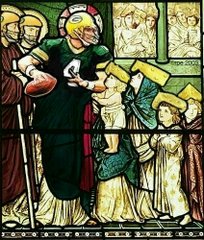A READING FROM THE BOOK OF CONCORD
THE DAY OF PENTECOST
THE LARGE CATECHISM: THE APOSTLES’ CREED
ARTICLE III.34-42: SANCTIFICATION
34] I believe in the Holy Spirit, the holy Christian Church, the communion of saints, the forgiveness of sins, the resurrection of the body, and the life everlasting. Amen.
35] I cannot connect this article (as I have said) I to anything better than Sanctification. Through this article the Holy Spirit, with His office, is declared and shown: He makes people holy (
1 Corinthians 6:11). Therefore, we must take our stand upon the term Holy Spirit, because it is so precise and complete that we cannot find another. …
37] “But how is such sanctifying done?”
Answer, “The Son receives dominion, by which He wins us, through His birth, death, resurrection, and so on. In a similar way, the Holy Spirit causes our sanctification by the following: the communion of saints or the Christian Church, the forgiveness of sins, the resurrection of the body, and the life everlasting. That means He leads us first into His holy congregation and places us in the bosom of the Church. Through the Church He preaches to us and brings us to Christ.
38] Neither you nor I could ever know anything about Christ, or believe on Him, and have Him for our Lord, unless it were offered to us and granted to our hearts by the Holy Spirit through the preaching of the Gospel (
1 Corinthians 12:3;
Galatians 4:6). …
40] Learn, then, to understand this article most clearly. You may be asked, “What do you mean by the words I believe in the Holy Spirit?”
You can then answer, I believe that the Holy Spirit makes me holy, as His name implies.
41] “But how does He accomplish this, or what are His method and means to this end?”
Answer: “By the Christian Church, the forgiveness of sins, the resurrection of the body, and the life everlasting. 42] For, in the first place, the Spirit has His own congregation in the world, which is the mother that conceives and bears every Christian through God’s Word (
Galatians 4:26). Through the Word He reveals and preaches, He illumines and enkindles hearts, so that they understand, accept, cling to, and persevere in the Word” (
1 Corinthians 2:12).
Condensed quotations from the Lutheran Confessions from Concordia: The Lutheran Confessions, copyright 2005, 2006 by Concordia Publishing House. Used by permission. All rights reserved.



 Jesus Christ, the only begotten Son of God, is the Word Who became flesh to dwell among us [
Jesus Christ, the only begotten Son of God, is the Word Who became flesh to dwell among us [









